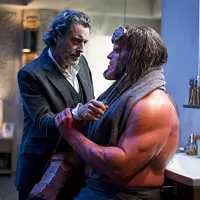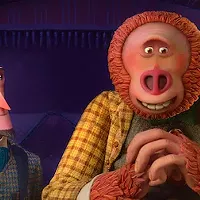

New Releases
MARRIED LIFE Now here's a movie with a cast worth salivating over, but what's the point when the end result turns out to be so negligible? I love the direction of Brosnan's non-Bond career (The Matador, The Tailor of Panama); Patricia Clarkson constantly earns her designation as an indie goddess; Rachel McAdams quickly (and deservedly) gained her footing as one of Hollywood's best young actresses; and Adaptation Oscar winner Chris Cooper is everyone's idea of an exemplary character actor. Yet director-writer Ira Sachs (adapting John Bingham's book Five Roundabouts to Heaven with co-scripter Oren Moverman) has assembled the quartet for a stifling domestic drama that promises mystery and intrigue yet only succeeds in wasting the talents of these exceptional actors. Set in 1949, this casts Cooper as Harry Allen, a pent-up businessman who seeks romance in a marriage in which his wife Pat (Clarkson, faring best of the four) wants only sex. Harry falls in love with a war widow named Kay (McAdams), and he tells his best friend Richard (Brosnan) that he plans to leave Pat and settle down with the fragile and much younger woman. What Harry doesn't tell Richard is that, because he can't bear the thought of Pat suffering after he leaves her (since he's sure she'll be devastated), he plans to murder her; what Richard doesn't tell Harry is that, from the moment he saw her, he's been plotting to steal Kay away from his longtime chum. Clarkson's presence brings to mind Todd Haynes' superb Far From Heaven (in which she had a supporting role), and one suspects that, like Haynes, Sachs was hoping to present an homage to the Douglas Sirk melodramas of the 1950s. Then again, it's impossible not to notice that McAdams' Kay is dolled up exactly like Kim Novak in Vertigo, so it's possible Sachs was shooting for Hitchcock comparisons. Either way, he falls woefully short, since Married Life lacks any semblance of genuine emotion, leaves out even one iota of sweat-inducing suspense, and collapses under the weight of an ending that not only isn't earned but contradicts its own key revelation. It's best to ignore these scenes from a marriage; stick with Ingmar Bergman instead. **
SNOW ANGELS Until The Assassination of Jesse James By the Coward Robert Ford (in which he appeared as Charley Ford), I didn't think it was possible for Sam Rockwell to play a role in which his actorly tics and mannerisms didn't get in the way of creating a flesh-and-blood person. Watching him in projects as diverse as The Green Mile and Matchstick Men, he doesn't seem to care whether his look-Ma-I'm-acting! brand of emoting meshes with the rest of the project or not. Rockwell's back to his showboating ways in Snow Angels, the fourth feature written and directed by N.C. School of the Arts graduate David Gordon Green (All the Real Girls, George Washington). Based on the novel by Stewart O'Nan, this ensemble piece focuses on the lives of several members of a small American community, and specifically on the circumstances (mostly tragic) that bind them together. The central plotline deals with the efforts of town beauty Annie (Kate Beckinsale), wasting away as a waitress at a Chinese restaurant, to keep her seemingly unstable husband Glenn (Rockwell) at bay, even if it means cheating him out of quality time with their young daughter Tara (Grace Hudson). The usual clichés apply here: Annie's carrying on an affair with the lunkheaded husband (Nicky Katt) of her best friend (Amy Sedaris); Glenn turns to God and to the bottle (not necessarily in that order) in an effort to quell his demons; and the spats between Annie and Glenn lead to an obvious conclusion that's made even more painfully obvious by the casting of jitterbug Rockwell. The secondary storyline concerns high school student Arthur (Michael Angarano) and the budding romance he enjoys with a quirky classmate (Juno's Olivia Thirlby), a balm to soothe the pain of witnessing his parents' messy split. These sections of the film work primarily because of the charming and natural performance by Angarano, a necessary counterpoint to Rockwell's patented grandstanding. **
STOP-LOSS Sign of the Times, Part I: While accepting his Oscar in 2003, Michael Moore is loudly booed for criticizing Bush's "fictitious" war in Iraq. Sign of the Times, Part II: During last week's advance screening of the new Iraq War drama Stop-Loss, audience members clap and cheer when Ryan Phillippe's character spits out, "Fuck the president!" Certainly, it's further proof that this country is finally making progress when it comes to expressing the proper attitude toward our War-Criminal-In-Chief, although, as far as cinema is concerned, we're probably still several years away from the definitive Iraq War flick. Stop-Loss at least comes closer than most of the others: Rather than getting buried in ham-fisted armchair liberalism (like Lions for Lambs and Rendition), it carefully tries to include something for everyone on both sides of the war divide. Yet while this approach is a thoughtful one, it can also be a dangerous one, as evidenced by late-inning occurrences that spit in the face of anyone who has ever taken a stand on moral grounds. Helming her first film since 1999's Boys Don't Cry, director Kimberly Peirce (co-scripting with Mark Richard) centers her tale on three Texas boys who all served together in Iraq and have returned to their hometown: Brandon King (Phillippe), a natural born leader and the most intelligent of the three; Steve Shriver (Channing Tatum), a jingoistic grunt prone to repeating canned rhetoric like, "We kill them in Iraq so we don't have to kill them here in Texas!"; and Tommy Burgess (Joseph Gordon-Levitt), the hard-drinking soldier who lost his best friend in the conflict. Having served plenty of time overseas, Brandon expects to settle down stateside, so he's understandably upset when Bush's "stop-loss" policy – basically, a back door draft – requires him to head back to Iraq yet again. Refusing direct orders, Brandon instead goes AWOL, a decision that irrevocably affects both Steve and Tommy. Despite its serious intentions, Stop-Loss often plays like a softer version of The Deer Hunter, and, without revealing too much, its about-face message ultimately isn't "Fuck the president" as much as it's "Fuck yourself" – a dispiriting message no matter how it's sliced. **1/2


